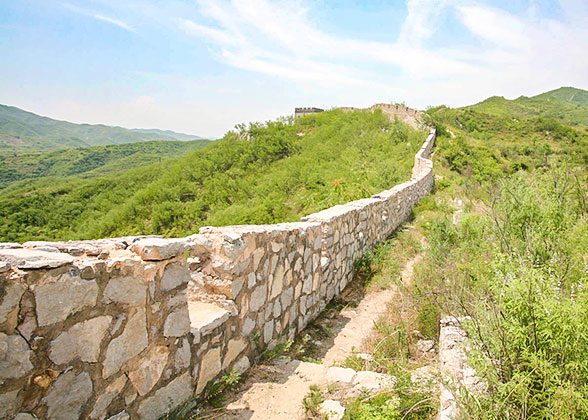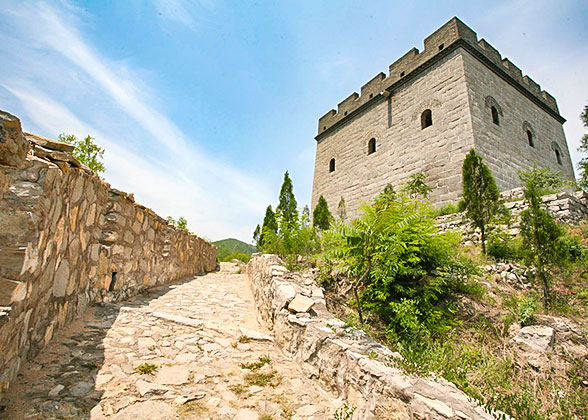Baimaguan Great Wall
Baimaguan Great Wall was built in the mountainous area in north suburb of Beijing, consisting of Baimaguan Fortress, Baimaguan Pass and defensive walls. Constructed in 1403 – 1424 and lack of renovation, many parts of it have been collapsed or in bad condition. But visitors can still tell its grandness from the relics. Around it, the Hongdongyu Water Pass and Perfect Watch Tower are also worth visiting.
It is in Miyun County, about 130 km (80 mi) north to Beijing downtown.
→ Reach Dongzhimen Transit Hub by subway line 2 or line 13.
→ Get on bus no. 980 Express there to Miyun Binhe Daqiao.
→ Change to bus no. Mi60 or Mi61 at the same stop and alight at Baimaguan. The Baimaguan Fortress is just about 50 meters (55 yards) away.
 Route: Baimaguan Pass - Bimaguan Ancient Fortress - Hongdongyu Water Pass - Perfect Watchtower
Route: Baimaguan Pass - Bimaguan Ancient Fortress - Hongdongyu Water Pass - Perfect Watchtower
After getting off from the bus, walk ahead for about 400 meters (440 yards) along the asphalt road, you will find the Baimaguan Pass. “Baima” in Chinese means “white horse”. According to a legend, the place was so named because there used to be a fierce white horse and was then tamed by a renowned general named Yang Yanzhao who defended this ancient pass. There is a high platform in its east corner. To the west and east of the pass, Great Wall relics extend to the mountain cliffs. They were built with stones and bricks. As the outer big stones and bricks were peeled off by locals or wind and rain, only inner part remain.
Then, walk back to visit Baimaguan Fortress. It is not very large. The southern gate of the fortress is well preserved and guarded by a white stone horse. Go inside and turn right, you will find stone stairs leading to the top. In addition to the southern gate, the west wall is in relatively good condition, through which you can tell the scale and grandness of the fortress. Wandering around inside the fortress, you can still find some old stone-laid houses, ancient wells, and grinding stones looking as they did originally.
Go back along the asphalt road for about 1,500 meters (1,650 yards), and then go upstream along a rocky and dried river bed, you will soon reach the Hongdongyu Water Pass. It was built to discharge flood. As the flood is usually not big, the water pass has been well preserved. You can see it is built with stones and rocks. Go under the arch and look up, a strip stone will surely attract your eye. Although broken, it has been there for a long time to support the upper part of the pass. On the two sides of Hongdongyu, there are also Great Wall ruins extending afar.
Return to the asphalt road and walk back for about 1.5 km (0.9mi), you should see a small bridge. Hike through the narrow valley below it, you will find the Perfect Tower upon on the mountain top. It was named so by hiking lovers because compared with other wild Great Wall towers, this one has been perfectly preserved. Different from other simple watchtowers, it consists of two storeys with the upper one looking like an ordinary residence in small version. You can see four vivid beasts' statues at each upward cornice. Stairs at the foot of arches are decorated with blooming lotus, which represents “peace” because of the similar pronunciation in Chinese. In case of collapse, the watchtower has been supported with steel structure inside.
After getting down, return to the asphalt road and find the nearest bus stop to take bus no. Mi60 or Mi61 back to Miyun Binhe Daqiao, then transfer to bus no. 980 Express back to Beijing.
1. It is not suggested you to set out this backpacking tour to Baimaguan alone. Find some companions or a local villager to help you complete this hiking tour.
2. It is not recommended to wear short-sleeve t-shirts, shorts, or skirt as you might get scratched by branches or grass leaves.
|
|
How to Get to Baimaguan Great Wall from Beijing Downtown
→ Reach Dongzhimen Transit Hub by subway line 2 or line 13.
→ Get on bus no. 980 Express there to Miyun Binhe Daqiao.
→ Change to bus no. Mi60 or Mi61 at the same stop and alight at Baimaguan. The Baimaguan Fortress is just about 50 meters (55 yards) away.
Recommended Baimaguan Great Wall Hiking Route
Baimaguan Pass
Baimaguan Fortress
Hongdongyu Water Pass
Perfect Watchtower
How to Get Back to Beijing
Tips
2. It is not recommended to wear short-sleeve t-shirts, shorts, or skirt as you might get scratched by branches or grass leaves.
- Last updated on Dec. 20, 2023 by Brenda Lian -

